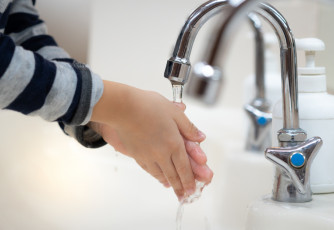
Environment
Important skill – washing hands!
Day to day around us there are thousands of microbes and we can meet them everywhere – when stepping into a bus, opening the gates of the kindergarten, holding a shopping back or even on the fruit, that we have put into that bag. Children want to explore and touch everything even more than adults, therefore they meet these microbes even more. Let’s learn to wash our hands – health is in the first place!
We definitely have to wash our hands before eating and after playing both outside and inside, as well as after using the toilet and playing with animals. The list is endless, but what interests children the most is the explanation why we need to wash our hands. To explain, what microbes are, it is important to visualize them and that can be done with the help of a fairytale or animation movie. Children themselves can visualise these microbes with the help of colorful paper or other materials. Afterwards the teacher can explain what happens when someone eats a microbes (pain, sickness, etc.). After children have learnt the theory, it’s time for a game, where everyone has to name an action after which you have to wash your hands.
It is useful to create a topical week about microbes, where children learn the right technique to wash hands.
How to correctly wash hands?*
– Wet your hands under running water
– Soap your hands
– At least for 15 seconds energetically soap your hands – from both sides, in between fingers, tips of your fingers, botgs thumbs, the surface of nails, etc.
– For at least 10 seconds wash them under running water
– Be careful not to spill water everywhere and do not touch the sink
– Dry your hands with a clean towel or a paper towel
– Throw the paper towel in the garbage without touching the garbage
Put up reminders that you have to wash your hands on the toilet doors, next to the entrance of the dining room and all the other important places. You can have children illustrate these reminders themselves.
*SPCC information

 Log In
Log In